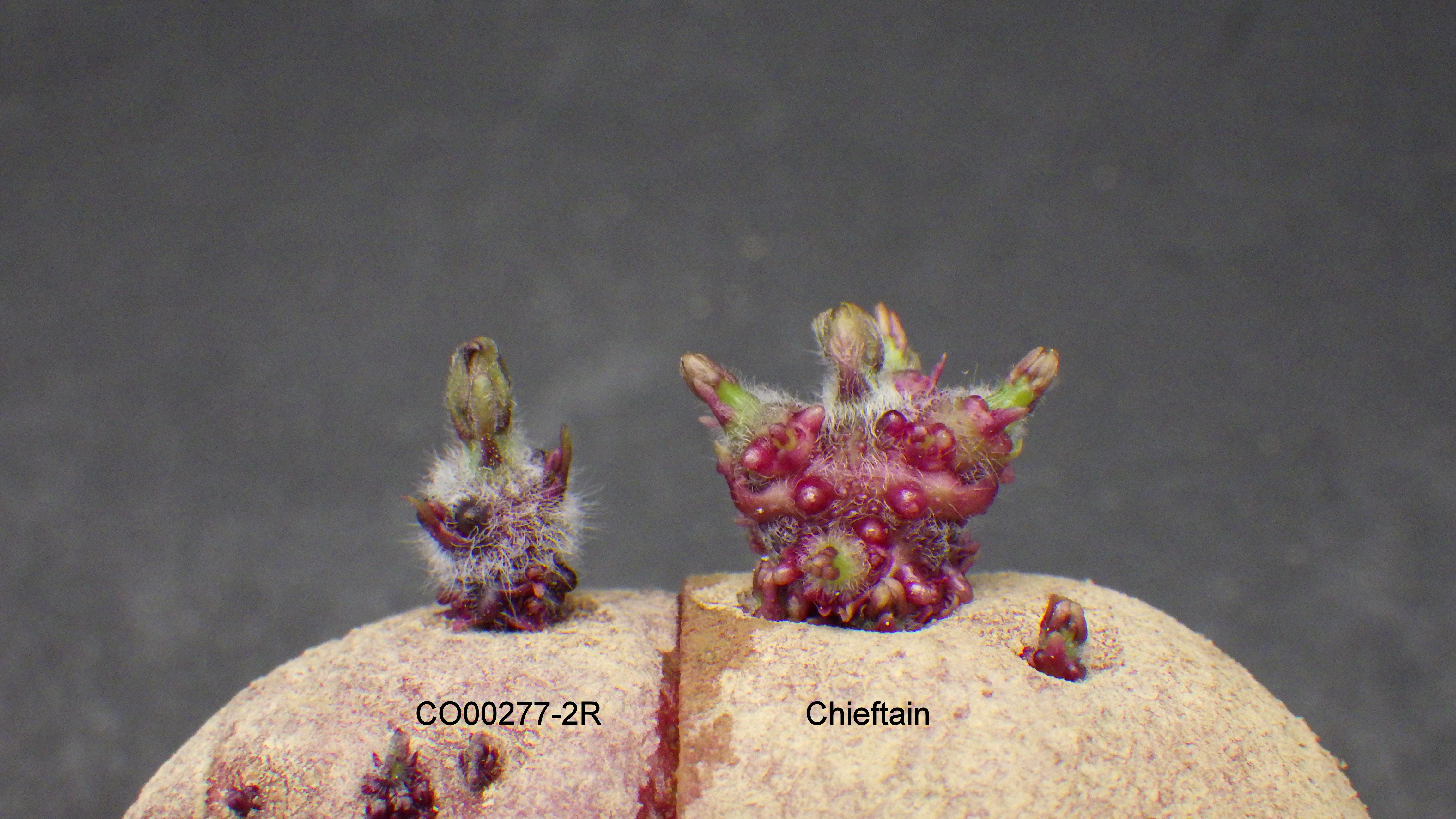Canada Rose
| Denomination: | 'Canada Rose' |
|---|---|
| Previously Proposed Denomination: | 'CO00277-2R' |
| Botanical Name: | Solanum tuberosum |
| Applicant/Holder: |
Colorado State University Research Foundation P.O. Box 483 Fort Collins, Colorado 80522 United States of America |
| Breeder: |
David Holm, Colorado State University, Center, United States of America |
| Agent in Canada: |
Canadian Eastern Growers Inc. 399 ch 1er rang DSL de Drummond, New Brunswick E3Y 2S8 Canada Tel: 506 479-2188 |
| Application Date: | 2018-07-19 |
| Provisional Protection:: | 2018-07-19 |
| Application Number: | 18-9581 |
| Grant of Rights Date: | 2020-08-17 |
| Certificate Number: | 6244 |
| Grant of Rights Termination Date: | 2040-08-17 |
Variety Description
Variety used for comparison: 'Chieftain'
Summary: The lightsprout for 'Canada Rose' is ovoid in shape with few root tips while that of 'Chieftain' is spherical with medium to many root tips. The base of the lightsprout for 'Canada Rose' has a medium proportion of blue in the anthocyanin colouration and dense to very dense pubescence while that of 'Chieftain' has an absent or low proportion of blue in the anthocyanin colouration and medium to dense pubescence. The leaf of 'Canada Rose' has a small to medium outline with strong presence of secondary leaflets while that of 'Chieftain' has a medium to large outline with a weak to medium presence of secondary leaflets. The midrib on the upper side of the leaf for 'Canada Rose' has a high extent of anthocyanin colouration with a medium to strong intensity while that of 'Chieftain' is of a medium extent with a weak to medium intensity. The leaflet of 'Canada Rose' has a shallow depth of veins and is medium to glossy on the upper side while that of 'Chieftain' has a medium depth of veins and a dull to medium glossiness. The plants of 'Canada Rose' are shorter than those of 'Chieftain'. The plants of 'Canada Rose' have a low to medium frequency of small inflorescences while those of 'Chieftain' have a medium to high frequency of medium to large inflorescences. The anthocyanin colouration on the inner side of the corolla for 'Canada Rose' is a very high extent of medium to strong intensity while that of 'Chieftain' is a high extent of weak to medium intensity.
Description:
LIGHTSPROUT: medium, ovoid, few root tips, short lateral shoots
LIGHTSPROUT BASE: strong to very strong intensity of anthocyanin colouration, medium proportion of blue in anthocyanin colouration, dense to very dense pubescence
LIGHTSPROUT TIP: medium size in relation to base, closed habit, medium intensity of anthocyanin colouration, medium density of pubescence
PLANT: foliage structure is leaf type where foliage is closed and stems are not or hardly visible, semi-upright growth habit, matures mid-season
STEM: medium extent of anthocyanin colouration along entire stem
LEAF: small to medium size outline, closed to intermediate openness, strong presence of secondary leaflets, medium to dark green upper side, very high extent and medium to strong intensity of anthocyanin colouration of upper side of midrib, absent or very low frequency of coalescence of terminal and lateral leaflets
SECOND PAIR OF LATERAL LEAFLETS: medium size, leaflet is narrower than long
LEAFLET: absent or very weak to weak waviness of margin, shallow veins, medium to glossy upper side, pubescence on blade at apical rosette
PEDUNCLE: low to medium extent of anthocyanin colouration
INFLORESCENCE: low to medium frequency per plant, small
FLOWER BUD: high extent of anthocyanin colouration
COROLLA: medium size
COROLLA (INNER SIDE): very high extent of anthocyanin colouration, medium to strong intensity of anthocyanin colouration, absent or low proportion of blue in anthocyanin colouration
TUBER: round, white flesh
TUBER EYE: shallow depth, red at base
TUBER SKIN: red
Origin & Breeding History: 'Canada Rose' (experimental designation CO00277-2R) originated from a cross between the varieties 'Colorado Rose', as the female parent, and CO94065-2R, as the male parent, conducted at the Colorado State University San Luis Valley Research Center, in Center, Colorado, USA in 2000. In 2001, the true potato seed resulting from the cross was sown in a greenhouse and the resulting seedling tubers field planted in Center, Colorado. One of the progeny, designated as 'CO00277-2R', was identified in 2002. Selection criteria was based on negative mass selection for agronomic characteristics and disease resistance.
Tests & Trials: The comparative trial for 'Canada Rose' was conducted by Global Agri Services Inc. during the 2018 growing season in Drummond, New Brunswick. The trial consisted of a single, 21 metre long row containing 70 plants spaced 0.3 metres apart for each variety. The distance between rows within the trial was 0.9 metres. Observations and measurements were taken from 10 plants, or 10 parts of plants, of each variety. The mean difference was significant at the 5% probability level based on a paired Student's t-test.
Comparison table for 'Canada Rose' with reference variety 'Chieftain'
Plant height (cm)
| 'Canada Rose' | 'Chieftain' | |
|---|---|---|
| mean | 35.0 | 62.3 |
| std. deviation | 6.2 | 3.2 |
Click on image for larger view

Potato: 'Canada Rose' (left) with reference variety 'Chieftain' (right)
- Date modified: